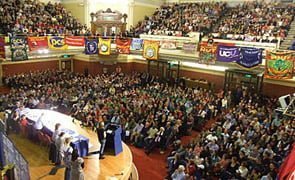Hundreds of striking Unison and Unite members filled the
large hall of Friends’ Meeting House in Euston on Wednesday afternoon following
a march through west central London. The turnout in and of itself was
impressive considering most of the strikers had been on picket duty since early
morning. The mood was buoyant and electric, with foot-stomping, flag-waving and
chanting while we waited for the meeting to start. I have not been to a strike
rally where the mood was so militant and combative since the miners’ strike.
Pre-prepared speeches from Jack Dromey of TGWU/Unite and
Keith Sonnet of Unison had, unfortunately, failed to anticipate the mood and
therefore fell a little flat. When it was said the employers were claiming
there was no money to fund a bigger pay rise, a shout of ‘bollocks’ from the
audience provoked laughter and summed up the attitude of the strikers. It is
known that the employers have made ‘efficiency’ savings of several billion
pounds which are swishing around in their bank accounts, as the speaker pointed
out. They have put the offer on the table with a ‘take it or leave it’ attitude
and have refused to return to the negotiating table.
A speaker from NUT said he hoped Unison and Unite would take
joint action with the teachers over pay restraint.
The final speaker, Mark Serwotka of civil service union PCS,
received a standing ovation after calling for co-ordinated action against pay
restraint by all the public sector unions. This is something Unison and Unite
members wholeheartedly agree with. Clearly, united industrial action is the
only way to force a decent living wage for public sector workers.
It was, therefore, disappointing to infer from the platform
that Unison and Unite may appeal to the conciliatory body ACAS. If the
employers agree to binding arbitration, which is by no means certain, it is
likely that we will achieve a higher offer, given the official rate of
inflation. However, it is highly unlikely we will receive the 6% increase the
unions are calling for and we will still be looking at an effective pay cut.
Former Tory leader John Major, no friend of the working class but relishing the
prospect of a Labour government locking horns with the unions, recently stated
in an interview that the real rate of inflation for workers on low and median
incomes is nearer 10% since these workers spend a large portion of their pay on
precisely those items (mortgages, food and fuel) that have seen the biggest
cost increases.
It is time for the union leaders to grasp the
nettle.






